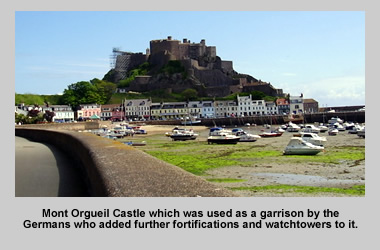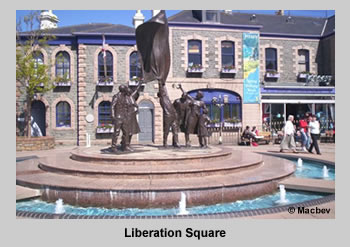On May 9th 1945 the Union Flag was raised at the Pomme d’Or.
For the islanders of Jersey, this is one of the most important days in their history. On 1st July 1940 the island was invaded and occupied by around 11,500 German troops (about one for every three islanders), following the bombing and strafing of the main town, St Helier. One of my relatives (I shall call him John) had gone from England to live on the island a year earlier.

One of Hitler’s early orders to the occupying forces was to round up 2,000 non-Jersey nationals, including children, and to send them to internment camps in Germany. John was living in a flat with two other young men from England and they were both selected for deportation, while he was not. It was easy to identify those people not born on the island, as all islanders had by this time been issued with I.D. cards.
John has told me about life on the island during the occupation. From the start, food rationing was introduced and there were shortages of basic items. The islanders were imaginative and he recalls drinking dried parsnip tea and acorn coffee and eating carrot jam and rabbit skins. Radios were confiscated and banned, although some people made and concealed crystal sets. John’s home was frequently searched by German soldiers looking for illicit radio equipment
A night curfew was introduced. John took me to a remote beach where he had cycled with a young couple one night and helped them to avoid the eyes of the patrolling Germans and escape in a rowing boat heading for France. He was too frightened to cycle home afterwards, as it was many hours after curfew time, so hid his bicycle in bushes and spent the night hiding on the hillside. He never discovered whether or not the couple had arrived safely.
The Germans brought in thousands of slave labourers from Russia, France, Spain, Algeria and Poland to build underground tunnels, bunkers, sea defences and railways. They were very harshly treated and many died of malnutrition and disease during the course of their labours. John recalled being in a field one day, and smelling a dreadful stench which grew stronger. It turned out to be a group of Russian labourers being escorted along the road to their place of work. Occasionally one of the workers would escape, and some were given refuge by islanders, at great risk to themselves, as even the act of giving food to a labourer was punishable by death.
Jews were required to register as Jews and their businesses were effectively closed down. The restrictions imposed on the Jews were far more draconian than those imposed on the other islanders, and breach of them meant deportation to internment or concentration camps.
As time went on, the shortages for the islanders became more severe. As well as food, by the autumn of 1944 fuel and medical supplies had almost run out. John told me that all the diabetics on the island died because there was no insulin. Trees were cut down for fuel, although the Germans would punish anyone found doing this. The islanders faced the prospect of starvation. There was a lifeline thrown to the islanders in December 1944 when a Red Cross ship managed to deliver essential supplies, although most of these were confiscated by the Germans.

On May 2nd 1945, the islanders realised that the end of their ordeal was in sight when those with clandestine radios heard of Hitler’s death. But it was not until May 9th that the occupying forces finally surrendered and Royal Naval ships arrived at the island. The sailors came ashore distributing biscuits, sweets, soap and cigarettes.
Loudspeakers were erected in the main square (now called Liberation Square) and a speech from Churchill was broadcast. John described the atmosphere of euphoria and how one of the first things the islanders did was to dismantle and destroy all of the German signs which had been put up, and to bring out their hidden radios.
The swastika flying from the Pomme d’Or Hotel, which had been commandeered by the Germans as living quarters for their officers, was lowered by the commander of the liberating force who handed the harbourmaster a Union Flag to hoist in its place.
May the 9th, Liberation Day, has ever since been a bank holiday in Jersey and the raising of the Union Flag from the Pomme d’Or is always the culmination of the events of the day.
Muggins in Sussex
© Muggins in Sussex 2008